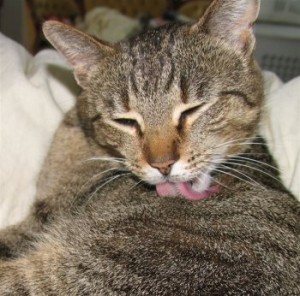Why Does a Cat Stop Using the Litter Box?
June 29, 2009 by LaBecs
Filed under Why Does a Cat Stop Using the Litter Box?
While cleaning out the litter box is not a wonderful chore that anyone enjoys, it is a necessity for your cat. This is, after all, your cat’s bathroom area and cats have a tendency to be very fastidious. If your cat suddenly starts having litter box problems and using the bathroom elsewhere, this might be a sign that you need to be cleaning that box more often. However, it can also be a sign of other problems, including serious medical conditions.
Reason #1: Busy Location
Cats are private animals. While a dog will do its business outside with everyone in the world watching and think nothing of it, cats have to relax in order to get the job done. If the litter box is located in an area where people are always coming and going, that’s going to be upsetting to your cat and he or she is likely to go elsewhere in the house, usually some place quiet like a corner.
Now, if you haven’t moved the litter box and if the traffic in the area hasn’t increased lately, but your cat has suddenly stopped using it, there’s probably another good reason.
Reason #2: Cat Preferences
Cats seem to be a lot pickier than dogs about everything from toys to food to sleeping locations. They are also sometimes very picky about their litter boxes. Many cats like certain types of litter better than others, possibly because of the way it feels on their paws. Other cats have litter box type preferences. While some love to have the covered boxes for more privacy, others prefer something that is a little more open so they can what is going on around them.
As with the first reason, if you haven’t made any changes that might upset your cat’s preference but he or she has suddenly stopped using the litter box, there is probably a different reason as the root cause.
Reason #3: Medical Problems
In some cases, a urinary infection or some other health problem can cause cats to have litter box problems. They may have a hard time going to the bathroom or may associate the litter box itself with discomfort which makes the box undesirable. If the sanitary reasons and the first two reasons don’t seem to explain the sudden change in your cat’s behavior, you should seek advice from a veterinarian immediately. Your cat might have a very serious health problem.
If you cat is defecating outside the litter box, he or she may have worms, gas, or other intestinal distress so a vet visit is definitely recommended. Remember that once your cat starts using the bathroom outside of the litter box, cleaning it with a solution that will destroy the enzymes in the urine or feces is essential. Otherwise your cat is going to continue to view that spot as an appropriate choice for going to the bathroom.

Amanda
Reason #4: Behavioral Problems
If you’ve ruled out all of the other reasons, you’ll have to start thinking like your cat and trying to pinpoint what may be the real problem. Anxiety can be one reason. A cat that doesn’t like to be left alone may use the bathroom outside the litter box as a sign of separation anxiety. A cat that’s angry because a new family member or pet has come into the picture may also start protesting by not using the litter box correctly.
When emotional issues are involved, you may find it harder to pinpoint the cause. However, you may be able to work with your vet on figuring out the best way to solve the problem so your cat can start using the litter box again and you can cut down on cleaning the carpet and other areas of your home.
Unfortunately, it’s very hard to fix a behavioral problem if you don’t know the exact cause. However, with patience and love, you might be able to find the cause and fix the problem. Sometimes medication can help. Do your research before taking any drastic measures. Always remember that no matter what he or she does, it’s not done to spite you. Cats are not capable of those ‘humanoid’ feelings. If your cat is having litter box problems, he doesn’t deserve to be punished or God forbid, euthanized, just because we don’t understand his reasons.
Excessive Grooming in Cats
June 6, 2009 by LaBecs
Filed under Excessive Grooming in Cats
In many cases, our pets develop issues that need special attention and there may be signs of potential problems. One of these issues is apparent when you observe excessive grooming in cats.

Beluga
Cats must groom themselves. It’s a natural part of their behavior. However, under some conditions, cats can groom themselves excessively. While you may not think this is a serious issue, it can be. If you notice excessive grooming in your cat, pay attention. They will vomit hairballs more often. In any case, try not to let it go on too long. The cat can end up with bald or red spots in certain areas of her skin, or an open sore.
Excessive grooming in cats can be linked to a lack of attention, boredom, insufficient grooming by the owner, and even separation anxiety. Many of us have a misconception that cats don’t need attention because they are aloof, independent, and free-spirited. That’s not the case. They may not be as needy as dogs but that doesn’t mean they don’t need attention and affection regularly.
If you notice your cat grooming too much, try distracting him or her, play a little bit. If the behavior then stops, you can attribute it to boredom and then you might help by providing more distractions. However, if the cat goes back to grooming right away take him or her to the vet as soon as possible. The vet can rule out parasites or a fungal infection. Your cat may be having an allergic reaction or could be suffering from an autoimmune problem. He or she can help treat the medical problems and can also assist you in stopping the behavior to prevent future medical issues. The vet might prescribe antihistamines, herbal calming remedies, and antianxiety medications that can help break the cycle and calm your cat.
While knowing what caused the behavior is not always necessary for effective treatment, it may help you to understand what brought about your cat’s obsession with excessive grooming. Changes in the environment and the resulting stress can sometimes be a cause. For example, if you have just added a new member to the family – feline, canine, or even human.
You won’t be able to tell from the behavior itself whether the cause is psychological or physical, but excessive grooming should definitely be discussed with your vet, especially if it accompanies other changes in your cat’s behavior, such as reduced energy levels.
The bottom line is that you should talk to your vet if your cat’s behavior disturbs you in anyway. Observe your cat and groom him or her yourself regularly. Being aware of any changes in your cats behavior can avoid difficult medical problems down the line.

